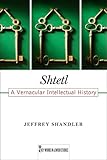Shtetl : A Vernacular Intellectual History / Jeffrey Shandler.
Material type: TextSeries: Key Words in Jewish Studies ; 5Publisher: New Brunswick, NJ : Rutgers University Press, [2014]Copyright date: ©2014Description: 1 online resource (192 p.) : 23 illustrationsContent type:
TextSeries: Key Words in Jewish Studies ; 5Publisher: New Brunswick, NJ : Rutgers University Press, [2014]Copyright date: ©2014Description: 1 online resource (192 p.) : 23 illustrationsContent type: - 9780813562735
- 9780813562742
- PN56.S545 S53 2014
- online - DeGruyter
- Issued also in print.
| Item type | Current library | Call number | URL | Status | Notes | Barcode | |
|---|---|---|---|---|---|---|---|
 eBook
eBook
|
Biblioteca "Angelicum" Pont. Univ. S.Tommaso d'Aquino Nuvola online | online - DeGruyter (Browse shelf(Opens below)) | Online access | Not for loan (Accesso limitato) | Accesso per gli utenti autorizzati / Access for authorized users | (dgr)9780813562742 |
Browsing Biblioteca "Angelicum" Pont. Univ. S.Tommaso d'Aquino shelves, Shelving location: Nuvola online Close shelf browser (Hides shelf browser)

|

|

|

|

|

|

|
||
| online - DeGruyter Like a Natural Woman : Spectacular Female Performance in Classical Hollywood / | online - DeGruyter Reading Prisoners : Literature, Literacy, and the Transformation of American Punishment, 1700-1845 / | online - DeGruyter Television in the Age of Radio : Modernity, Imagination, and the Making of a Medium / | online - DeGruyter Shtetl : A Vernacular Intellectual History / | online - DeGruyter Mean Lives, Mean Laws : Oklahoma's Women Prisoners / | online - DeGruyter Tainted Earth : Smelters, Public Health, and the Environment / | online - DeGruyter Jewish on Their Own Terms : How Intermarried Couples are Changing American Judaism / |
Frontmatter -- Contents -- Foreword -- Acknowledgments -- Introduction -- 1. Talk of the Town -- 2. Forsht ayer shtetl! -- 3. Shtetl Fabulous -- Notes -- Index -- About the Author
restricted access online access with authorization star
http://purl.org/coar/access_right/c_16ec
In Yiddish, shtetl simply means "town." How does such an unassuming word come to loom so large in modern Jewish culture, with a proliferation of uses and connotations? By examining the meaning of shtetl, Jeffrey Shandler asks how Jewish life in provincial towns in Eastern Europe has become the subject of extensive creativity, memory, and scholarship from the early modern era in European history to the present. In the post-Holocaust era, the shtetl looms large in public culture as the epitome of a bygone traditional Jewish communal life. People now encounter the Jewish history of these towns through an array of cultural practices, including fiction, documentary photography, film, memoirs, art, heritage tourism, and political activism. At the same time, the shtetl attracts growing scholarly interest, as historians, social scientists, literary critics, and others seek to understand both the complex reality of life in provincial towns and the nature of its wide-ranging remembrance. Shtetl: A Vernacular Intellectual History traces the trajectory of writing about these towns-by Jews and non-Jews, residents and visitors, researchers, novelists, memoirists, journalists and others-to demonstrate how the Yiddish word for "town" emerged as a key word in Jewish culture and studies. Shandler proposes that the intellectual history of the shtetl is best approached as an exemplar of engaging Jewish vernacularity, and that the variable nature of this engagement, far from being a drawback, is central to the subject's enduring interest.
Issued also in print.
Mode of access: Internet via World Wide Web.
In English.
Description based on online resource; title from PDF title page (publisher's Web site, viewed 30. Aug 2021)


